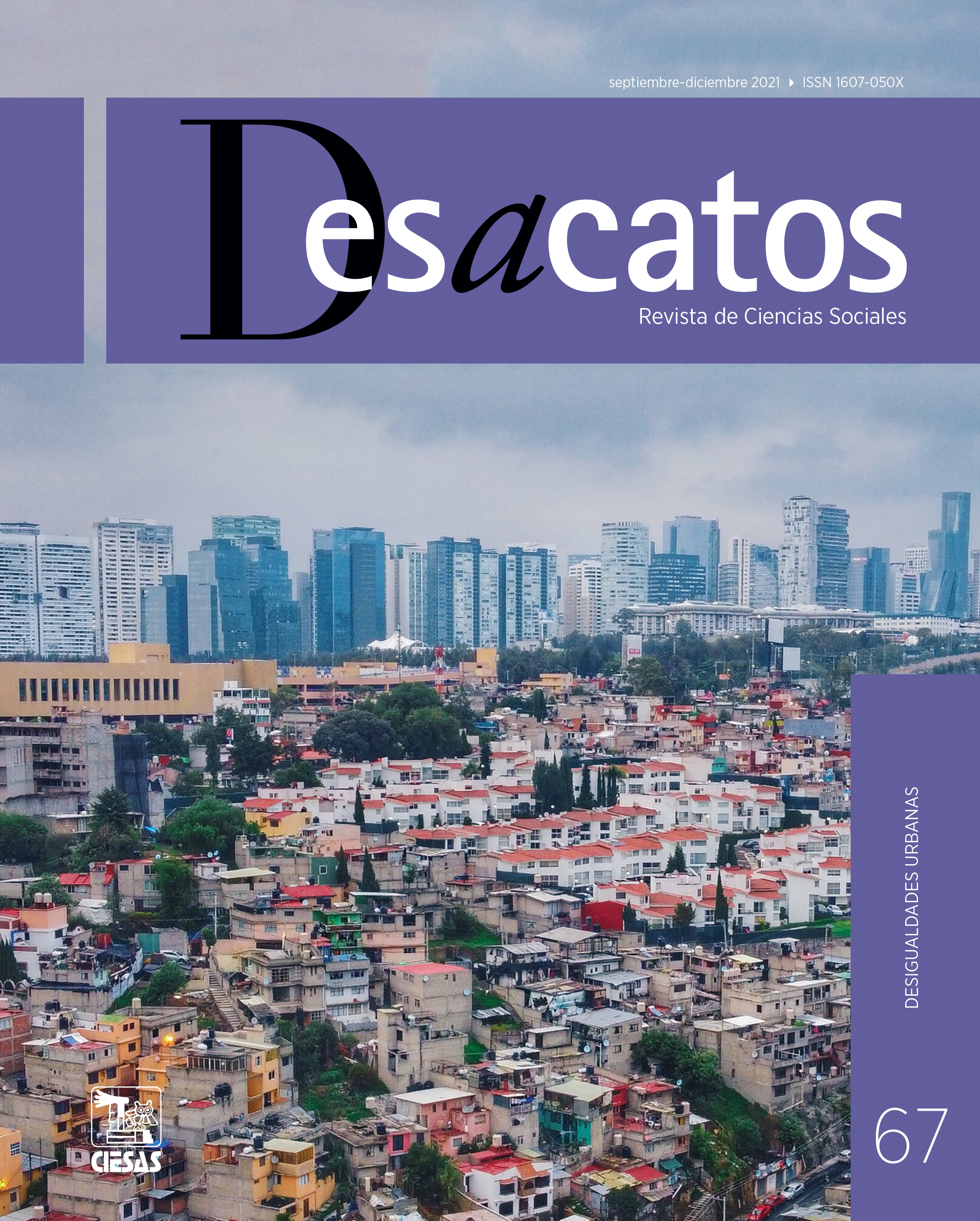Encuentros a través del espacio y categorías: ¿trabajadoras domésticas como hilo conector en la ciudad segregada?
Palabras clave:
trabajo domestico, segregación, encuentros, micro públicos, etnografíaResumen
En este artículo se analizan las conexiones, encuentros e intercambios que tienen lugar en y durante los movimientos diarios de las trabajadoras domésticas en Bogotá, Colombia. En específico, se examinan las relaciones e interacciones de las trabajadoras en sus lugares de residencia, durante el transporte, en sus lugares de trabajo y en otros contextos sociales —micropúblicos— para comprender el alcance y los límites de la segregación y la exclusión, así como las resistencias en las prácticas cotidianas de las mujeres. La investigación etnográfica muestra el relativo aislamiento social de las trabajadoras domésticas debido a las condiciones laborales y el distanciamiento social. El artículo contribuye a los debates sobre las desigualdades urbanas y el derecho a la ciudad.
Descargas
Referencias
Amin, A. 2002. Ethnicity and the Multicultural City: Living with diversity. Environment and Planning A, 34, 959–980.
Askins, K. 2015. Being Together: Everyday geographies and the quiet politics of belonging. ACME An International Journal for Critical Geographies 14(2), 470–478.
Augé, M. 1995. Non-places: Introduction to an anthropology of supermodernity, London, New York, Verso.
Binnie, J., Holloway, J., Millington, S. and Young C., ed. 2006. Cosmopolitan Urbanism. London: Rutledge.
Boggs, C. 1977. Marxism, Prefigurative Communism, and the Problem of Workers' Control. Radical America 11 (November).
Carter, J.C. 2003. Neoliberal Economic Reforms and Urban Sociospatial Change in Latin America: The case of La Serena-Coquimbo, Chile. PhD dissertation, Department of Geography, University of California, Santa Barbara, CA.
Coy, M. 2006. Gated Communities and Urban Fragmentation in Latin America: The Brazilian experience. GeoJournal 66.1/2, 121–32.
Dirksmeier, P., Helbrecht, I. 2015. Everyday Urban Encounters as Stratification Practices. City, 19:4, 486-498.
Donald, J. 1999. Imagining the Modern City. Minneapolis, MN: University of Minnesota Press.
Fincher, R. 2003. Planning for Cities of Diversity, Difference and Encounter. Australian Planner 40, 55–58.
Fleischer, F., Marín, K. 2019. Atravesando la ciudad. La movilidad y experiencia subjetiva del espacio por las empleadas domésticas en Bogotá. EURE 45:135, 27-47.
Foucault, M. 1980. Power/Knowledge. Selected Interviews and Other Writings 1972–1977. Edited by Colin Gordon. New York: Vintage Books.
Graeber, D. 2004. Fragments of an Anarchist Anthropology (2nd pr. ed.). Chicago: Prickly Paradigm Press
Irazábal, C. 2009. One Size Does not Fit All: Land markets and property rights for the construction of the just city. International Journal of Urban and Regional Research 33.2, 558–63.
Jacobs, J. 1992. The Death and Life of Great American Cities. New York: Vintage.
Jirón P. 2012. Mobility Challenges in Santiago de Chile: Improving Diagnosis and the Need to Shift the Understanding of Urban Inequality from Fixed Enclaves to Mobile Gradients. In: Rodgers D., Beall J., Kanbur R. (eds) Latin American Urban Development into the 21st Century. Studies in Development Economics and Policy. Palgrave Macmillan, London.
Leitner, H. 2012. Spaces of Encounters: Immigration, Race, Class, and the Politics of Belonging in Small-Town America. Annals of the Association of American Geographers 102 (4): 828–846.
Lim, J. 2010. “Immanent Politics: Thinking Race and Ethnicity through Affect and Machinism.” Environment and Planning A 42 (10): 2393–2409.
Matejskova, T., and Leitner, H. 2011. Urban encounters with difference: The contact hypothesis and immigrant integration projects in eastern Berlin. Social & Cultural Geography, 12, 717–741.
Peterson, M. 2017. Living with Difference in Hyper-Diverse Areas: How important are encounters in semi-public spaces? Social & Cultural Geography, 18:8, 1067-1085.
Roberts, B.R. 2005. Globalization and Latin American Cities. International Journal of Urban and Regional Research 29.1, 110–23.
Rodgers, D., J. Beall and R. Kanbur. 2012. Towards a New Research Agenda for 21st Century Latin American Urban Development. In D. Rodgers, J. Beall and R. Kanbur (eds), Latin American Urban Development into the 21st Century: Towards a Renewed Perspective on the City. London and New York: Palgrave Macmillan, 2012, pp. 259–64.
Rodríguez, J. and Arraigada, C. 2003. Segregación residencial en áreas metropolitanas de América Latina: magnitud, características, evolución e implicaciones de política. Santiago de Chile: CEPAL-ONU.
Rodríguez, J. and Arriagada, C. 2004. Segregación Residencial en la Ciudad Latinoamericana. EURE (Santiago), 30(89), 5-24.
Sabatini, F. 2003. La Segregación Social del Espacio en las Ciudades de América Latina. Documentos del Instituto de Estudios Urbanos y Territoriales, Serie Azul, 35, Julio de 2003.
Sennett, R. 2002. Cosmopolitanism and the Social Experience of Cities. In Conceiving Cosmopolitanism. Theory, Context and Practice, edited by S. Vertovec, and R. Cohen, 42–47. Oxford: Oxford University Press.
Simmel, G. 2002. The Metropolis and Mental Life. In The Blackwell City Reader, edited by G. Bridge, and S. Watson, 11–19. Malden, MA: Blackwell.
Thibert, J. and Osorio G.A. 2013. Urban segregation and Metropolitics in Latin America: The case of Bogota, Colombia. International Journal of Urban and Regional Research 38: 1319–1343.
Thrift, N. 2005. But Malice Aforethought: Cities and the natural history of hatred. Transactions of the Institute of British Geographers NS 30, 133–50.
Valentine, G. 2008. Living with difference: Reflections on geographies of encounter. Progress in Human Geography, 32, 323–337.
Valentine, G., and L. Waite. 2012. Negotiating Difference through Everyday Encounters: The Case of Sexual Orientation and Religion and Belief. Antipode 44 (2): 474–492.
Watson, S. 2009. The Magic of the Marketplace: Sociality in a Neglected Public Space. Urban Studies 46 (8): 1577–1591.
Publicado
Número
Sección
Licencia
.


 Enviar un artículo
Enviar un artículo
 Idioma
Idioma
 Información
Información

 Palabras clave
Palabras clave Redes sociales
Redes sociales